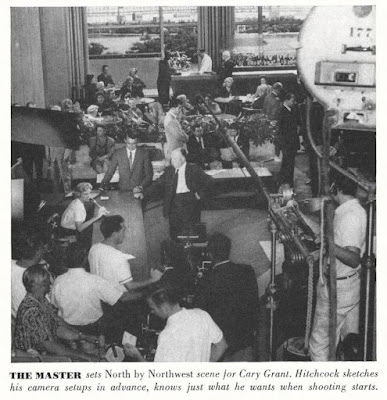MOST people will agree that this man was a . . .
"Master of Mayhem."
Concerning Alfred Hitchcock (1899-1980; Wikipedia HERE; the SFE HERE; the ISFDb HERE; The Hitchcock Zone HERE; and the IMDb HERE).
By Jon Whitcomb (1906-88).
First appearance: Cosmopolitan, October 1959.
Article (4 pages).
Online at Archive.org (HERE; go to text page 22).
"It must have imagination and originality. I believe, furthermore, that logic is dull. I approach crime with fantasy."
HERE we have a celebrity profile of Alfred Hitchcock near the peak of his Hollywood period, as well as a sneaky promotional piece for the impending Christmas release of North by Northwest. Things were going very well for Hitchcock in the 1950s: nearly all of his movies were hits, his TV show got good ratings, and his magazine was selling nicely—and this was just before Psycho ("Don’t ask for clues on the subject matter. You'll just have to be surprised").
His technique:
"Hitchcock’s preparations before shooting are so complete that he endures the actual filming process as an anticlimax. He never worries about progress, as all problems have been anticipated and licked beforehand. He sees the finished picture complete in his mind’s eye, and this is why he never bothers to look through the finder of a camera."
The British knack:
"Hitchcock constructed a script from the novel by a British mystery writer, Henry Cecil. The English, he feels, have considerably more flair for crime and criminals than Americans: They are more inclined to relish fine points of technique and have a quicker appreciation for grisly details. England seems to supply a higher proportion of colorful misdeeds and piquant evil-doers. And with them goes a large posse of writers (like Agatha Christie) who organize the material into novels and screenplays of great finesse and ingenuity."
The McGuffin:
"All Hitchcock films devote much attention to The McGuffin. This term is used to describe what the crooks are after, be it atomic secrets, plans for the fortifications, or the kidnap ransom. If The McGuffin is sufficiently interesting, the picture is bound to be a success."
References and resources:
- Movie titles, not all of them Hitchcock's (WARNING! SPOILERS ABOUND! in Wikipedia):
Rebecca (HERE), Suspicion (HERE), Dial M for Murder (HERE), Rear Window (HERE), To Catch a Thief (HERE), The Trouble with Harry (HERE), Vertigo (HERE), North by Northwest (HERE), No Bail for the Judge (HERE and HERE), The Unforgiven (HERE), Psycho (HERE), Diabolique (HERE), Woman to Woman (HERE), Lifeboat (HERE), Spellbound (HERE), High Noon (HERE), and "a current film based on Nazi atrocities which made money as a play" (Is that the 1959 Playhouse 90 version of Judgment at Nuremberg or the upcoming film? HERE and HERE).
- People and names, not all of them actors:
Elsie Dinsmore (HERE), Charles Addams (HERE), Vera Miles (HERE), Kim Novak (HERE), Gordon Scott (HERE), Audrey Hepburn (HERE), Tony Perkins (HERE), Burt Champion, Judith Evelyn (HERE), James Stewart (HERE), Samuel Taylor (HERE), Henry Cecil (HERE), Agatha Christie (HERE), Carole Lombard (HERE), Cecil B. DeMille (HERE), Alma Reville (HERE), Tallulah Bankhead (HERE), Dorothy Thompson (HERE), Eva Marie Saint (HERE), Marlene Dietrich (HERE), Grace Kelly (HERE), and Marilyn Monroe (HERE).
- Starting in 1933, Jon Whitcomb was primarily an illustrator for the slicks (e.g., Collier's, McCall's, Cosmopolitan, etc.) who infrequently got writing assignments that featured well-known showbiz celebrities of the day (e.g., Lana Turner, Brigitte Bardot, Warren Beatty).
See FictionMags (HERE) for a listing of his work.
Unless otherwise noted, all bibliographical data are derived from The FictionMags Index created by William G. Contento & edited by Phil Stephensen-Payne.
~~~~~~~~~~~~~~~~~~~~~~~~~~~~~~~~~~~~~~~~~~~~~~~~~~~~~~~~~~~~~~~~~~~~~~~~~~~~
.png)










.jpg)



















.jpg)




.jpg)







.jpg)




